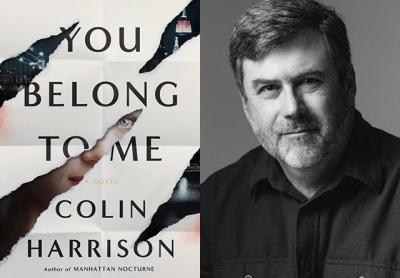Obsession in the City

“You Belong to Me”
Colin Harrison
Sarah Crichton Books, $27
If there is such a thing as “classic” Colin Harrison, the Brooklyn and Jamesport-based writer’s new novel, “You Belong to Me,” would certainly qualify. This, Mr. Harrison’s eighth novel, is yet another of his New York noirs that marry traditional crime fiction with elements of social observation.
Fans of the author will find the usual hallmarks: panoramic descriptions of Manhattan life; a successful, and highly sexual, white-collar hero; an exhaustive knowledge of esoteric subject matter (in this novel, map collecting), and hair-raising scenes of violence that are meticulously detailed. Mr. Harrison’s 2000 novel, “Afterburn,” for example, contained scenes of torture that I am still trying to forget.
“You Belong to Me” is a somewhat gentler affair. The hero, Paul Reeves, is a Manhattan immigration lawyer obsessed with collecting old maps of New York. As the novel opens, Reeves is on his way to a map auction with his friend Jennifer Mehraz, the beautiful young wife of an Iranian financier. The stroll to the auction house is described with the author’s usual eye for New York atmosphere:
“Now they were cutting through Rockefeller Center, where the Friday lunchtime crowds were out, men in their shirtsleeves, women letting the September sun hit their legs, eating their expensive sandwiches, phoning, texting, watching and being watched.”
The author extends his set piece to describe a Christie’s auction from the inside, then expounds on some of the finer points of map collecting. The sexual tension between Jennifer and Paul intensifies as the collector secures his prize. Then Jennifer is suddenly whisked away by a mysterious man in army fatigues. Game on.
As in many of Mr. Harrison’s novels, the writer pursues a number of separate plot lines that seem hopelessly disparate, only to eventually tie them together with enviable skill. In this novel, Jennifer revives an old affair, infuriating her wealthy husband, Ahmed. Paul pursues another, more valuable map, while Ahmed, along with his Uncle Hassan, assembles a bevy of lowlife assassins to take on Jennifer’s lover. Suffice to say that these narratives all collide with swift and bracing brutality. The revenge is served up cold, with maximum collateral damage. Violence begets violence, especially in a Colin Harrison novel.
Of course, if it’s sheer murder and mayhem you’re looking for, there are any number of contemporary writers even more grisly than Mr. Harrison. The reason this author stands out in the world of noir is his ability to keep a plot rolling even as he indulges his strong social eye and personal esoteric pursuits. If, for example, you think map collecting isn’t exactly a subject matter to get your loins buzzing, “You Belong to Me” might make you think again. Here is Paul Reeves on the subject of an 18th-century New York map that he covets, described with an almost erotic feverishness:
“The delicate lines drawn by a surveyor in 1766. The irregular lettering set in type. The attention to inlets where ships could be hidden, the heights where cannons could be placed. The implicit message, given the enormous care and detail of the map, a loyal warning to the King of England: this rich, fabulous island of Manhattan will be fought over, this New York City will be where destiny turns. My city, Paul thought.”
Not all of the rabbit holes Mr. Harrison explores are of equal interest, however. One chapter, for example, begins this way: “Very few people understand the history of tape.” Well, you’ve got me there. “That it was first made with tree sap, animal parts, and especially boiled fish bones, all natural adhesives slathered onto strips of eel skin, fabric, and rag-content paper.” The excitement mounts as the author moves on to explain cellophane tape. Earlier in the novel is a shorter, and punchier, disquisition on New York City rats.
Since the ambition in Mr. Harrison’s work indicates a wish to be taken as a serious novelist, it must be mentioned that the characterizations in “You Belong to Me” can sometimes veer into cliché. Paul Reeves is a likable, well-rounded hero. But the villain Ahmed is a cipher, and yet another possessive Middle Eastern man with an Othello complex via American blondes. There is Paul’s girlfriend, Rachel, a frivolous advertising executive who sounds like she’s on loan from Candace Bushnell. “Because he was eligible,” Rachel thinks of Paul. “Because she wasn’t getting any younger.”
All the heavies in the novel are Middle Eastern and Latino cutouts, and the novel’s one gay character gets a two-page inner monologue that somehow equates homosexuality with the exclamation point. “So happy! He shook hands with the hunk-a-dunk and gave him an If ever you want to try something different smile, found a cab magically, and was soon back on his way uptown! . . . So exciting!”
What is exciting is watching Mr. Harrison take these shaky characterizations and still manage to spin a gripping potboiler. It’s good to know that the author’s gift for momentum is intact, as is his love for New York. After a lavish description of the timeless Grand Central Oyster Bar, one of his characters states, memorably, “You had to have places in the city like that, or you didn’t know who you were anymore.”
Paul Reeves’s map collecting, then, becomes a metaphor for freezing a city in time. It’s an illusion, of course, but one that Mr. Harrison, the so-called “bard of New York noir,” can’t help but indulge.
Kurt Wenzel is a novelist and a regular book reviewer for The Star. He lives in Springs.
